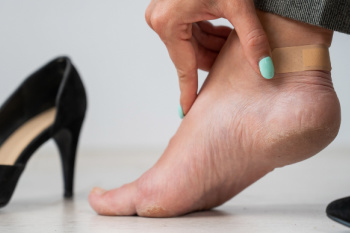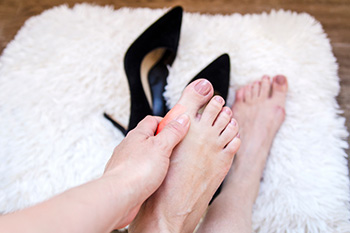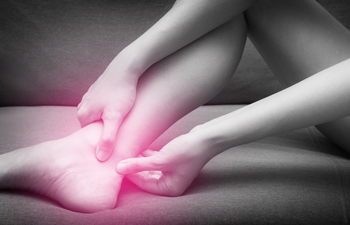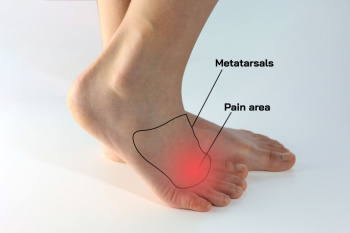Items filtered by date: August 2024
Friction Blisters on the Feet and How to Prevent Them

Friction blisters on the feet occur when repeated rubbing against the skin causes fluid-filled sacs to form, often leading to pain and discomfort. These blisters typically develop in areas where shoes or socks cause excessive friction. To prevent friction blisters, choosing well-fitting footwear that provides adequate support and cushioning is vital. Opting for moisture-wicking socks helps reduce friction and keeps feet dry. Additionally, using blister prevention tape or pads on areas prone to friction can provide an extra layer of protection. Ensuring that shoes are properly broken in before extensive use also helps to minimize the risk. If you have blisters on your feet that are bothersome or have become infected, it is suggested that you consult a podiatrist who can treat this condition, and offer you effective prevention methods.
Blisters may appear as a single bubble or in a cluster. They can cause a lot of pain and may be filled with pus, blood, or watery serum. If your feet are hurting, contact one of our podiatrists of Princeton Foot & Ankle Associates. Our doctors can provide the care you need to keep you pain-free and on your feet.
Foot Blisters
Foot blisters are often the result of friction. This happens due to the constant rubbing from shoes, which can lead to pain.
What Are Foot Blisters?
A foot blister is a small fluid-filled pocket that forms on the upper-most layer of the skin. Blisters are filled with clear fluid and can lead to blood drainage or pus if the area becomes infected.
Symptoms
(Blister symptoms may vary depending on what is causing them)
- Bubble of skin filled with fluid
- Redness
- Moderate to severe pain
- Itching
Prevention & Treatment
In order to prevent blisters, you should be sure to wear comfortable shoes with socks that cushion your feet and absorb sweat. Breaking a blister open may increase your chances of developing an infection. However, if your blister breaks, you should wash the area with soap and water immediately and then apply a bandage to the affected area. If your blisters cause severe pain it is important that you call your podiatrist right away.
If you have any questions, please feel free to contact our offices located in Princeton, and West Windsor, NJ . We offer the newest diagnostic and treatment technologies for all your foot care needs.
Why High Heels Are Bad for Your Feet

High heels may look great, but they can cause significant foot problems and impact overall body health. The pressure and angle of high heels can lead to a range of issues, such as bunions, hammertoes, and neuromas, often requiring surgery to correct. Wearing high heels also affects your posture, which can lead to back, leg, and foot pain as the body tries to compensate for the imbalance they create. The altered gait from wearing heels can overwork the hip flexors and knee muscles, increasing the risk of joint and muscle pain. Balance is also compromised, increasing the likelihood of falls and sprained ankles. High heels force the lumbar spine to flatten and the thoracic spine to curve excessively, possibly causing chronic back pain. The continuous flexing of hip muscles can lead to their contraction and shortening, contributing to hip and lower back pain. Consulting a podiatrist can provide valuable insights and treatments tailored to individual needs. If you have foot pain related to wearing high heels, it is suggested that you schedule an appointment with a podiatrist for a diagnosis and treatment.
High heels have a history of causing foot and ankle problems. If you have any concerns about your feet or ankles, contact one of our podiatrists from Princeton Foot & Ankle Associates. Our doctors can provide the care you need to keep you pain-free and on your feet.
Effects of High Heels on the Feet
High heels are popular shoes among women because of their many styles and societal appeal. Despite this, high heels can still cause many health problems if worn too frequently.
Which Parts of My Body Will Be Affected by High Heels?
- Ankle Joints
- Achilles Tendon – May shorten and stiffen with prolonged wear
- Balls of the Feet
- Knees – Heels cause the knees to bend constantly, creating stress on them
- Back – They decrease the spine’s ability to absorb shock, which may lead to back pain. The vertebrae of the lower back may compress.
What Kinds of Foot Problems Can Develop from Wearing High Heels?
- Corns
- Calluses
- Hammertoe
- Bunions
- Morton’s Neuroma
- Plantar Fasciitis
How Can I Still Wear High Heels and Maintain Foot Health?
If you want to wear high heeled shoes, make sure that you are not wearing them every day, as this will help prevent long term physical problems. Try wearing thicker heels as opposed to stilettos to distribute weight more evenly across the feet. Always make sure you are wearing the proper shoes for the right occasion, such as sneakers for exercising. If you walk to work, try carrying your heels with you and changing into them once you arrive at work. Adding inserts to your heels can help cushion your feet and absorb shock. Full foot inserts or metatarsal pads are available.
If you have any questions please feel free to contact our offices located in Princeton, and West Windsor, NJ . We offer the newest diagnostic and treatment technologies for all your foot and ankle needs.
Causes and Symptoms of an Achilles Tendon Injury

An Achilles tendon injury involves damage to the tendon that connects the calf muscles to the heel bone. This tendon plays a vital role in walking, running, and jumping by enabling movement of the foot and supporting the body’s weight. Injuries typically arise from excessive stress or sudden movements, often due to overuse, especially in sports, or from sudden increases in activity levels. Other contributing factors include poor footwear or inadequate warm-up routines. Common symptoms of an Achilles tendon injury can include sharp pain at the back of the ankle, swelling, and difficulty while walking or standing on tiptoe. If you have endured this type of injury, it is strongly suggested that you promptly visit a podiatrist who can offer you effective treatment solutions.
Achilles tendon injuries need immediate attention to avoid future complications. If you have any concerns, contact one of our podiatrists of Princeton Foot & Ankle Associates. Our doctors can provide the care you need to keep you pain-free and on your feet.
What Is the Achilles Tendon?
The Achilles tendon is a tendon that connects the lower leg muscles and calf to the heel of the foot. It is the strongest tendon in the human body and is essential for making movement possible. Because this tendon is such an integral part of the body, any injuries to it can create immense difficulties and should immediately be presented to a doctor.
What Are the Symptoms of an Achilles Tendon Injury?
There are various types of injuries that can affect the Achilles tendon. The two most common injuries are Achilles tendinitis and ruptures of the tendon.
Achilles Tendinitis Symptoms
- Inflammation
- Dull to severe pain
- Increased blood flow to the tendon
- Thickening of the tendon
Rupture Symptoms
- Extreme pain and swelling in the foot
- Total immobility
Treatment and Prevention
Achilles tendon injuries are diagnosed by a thorough physical evaluation, which can include an MRI. Treatment involves rest, physical therapy, and in some cases, surgery. However, various preventative measures can be taken to avoid these injuries, such as:
- Thorough stretching of the tendon before and after exercise
- Strengthening exercises like calf raises, squats, leg curls, leg extensions, leg raises, lunges, and leg presses
If you have any questions please feel free to contact our offices located in Princeton, and West Windsor, NJ . We offer the newest diagnostic tools and technology to treat your foot and ankle needs.
Gout Pain Can Be Managed
Gout Pain Can Be Managed
Definition and Relief Methods of Morton’s Neuroma

Morton's neuroma is a compressive neuropathy of the forefoot interdigital nerve, that results in a thickening of tissue surrounding the nerves leading to the toes. It typically affects the nerves between the third and fourth toes. This condition causes pain, numbness, or a burning sensation in the ball of the foot, often worsened by wearing narrow shoes or high heels that squeeze the toes together. Relief methods focus on alleviating pressure on the affected nerve, such as wearing shoes with a wide toe box to reduce compression. Padded inserts or orthotics can help to distribute weight evenly and support the arch, relieving strain on the forefoot. Massaging the area can reduce inflammation and provide temporary relief. In severe cases, corticosteroid injections or surgical removal of the neuroma may be considered to alleviate persistent symptoms and restore comfort and function to the foot. If you have pain in this part of your foot, it is suggested that you promptly schedule an appointment with a podiatrist who can successfully diagnose and treat Morton’s neuroma.
Morton’s neuroma is a very uncomfortable condition to live with. If you think you have Morton’s neuroma, contact one of our podiatrists of Princeton Foot & Ankle Associates. Our doctors will attend to all of your foot care needs and answer any of your related questions.
Morton’s Neuroma
Morton's neuroma is a painful foot condition that commonly affects the areas between the second and third or third and fourth toe, although other areas of the foot are also susceptible. Morton’s neuroma is caused by an inflamed nerve in the foot that is being squeezed and aggravated by surrounding bones.
What Increases the Chances of Having Morton’s Neuroma?
- Ill-fitting high heels or shoes that add pressure to the toe or foot
- Jogging, running or any sport that involves constant impact to the foot
- Flat feet, bunions, and any other foot deformities
Morton’s neuroma is a very treatable condition. Orthotics and shoe inserts can often be used to alleviate the pain on the forefront of the feet. In more severe cases, corticosteroids can also be prescribed. In order to figure out the best treatment for your neuroma, it’s recommended to seek the care of a podiatrist who can diagnose your condition and provide different treatment options.
If you have any questions, please feel free to contact our offices located in Princeton, and West Windsor, NJ . We offer the newest diagnostic and treatment technologies for all your foot care needs.

